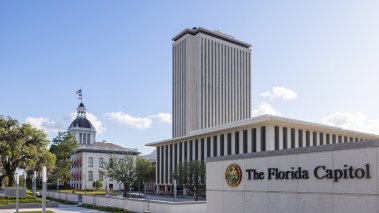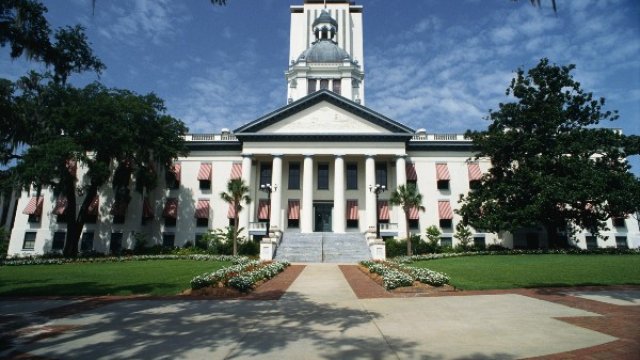Table of Contents
Thought the ‘Stop WOKE Act’ was bad? A new Florida bill is worse

Roberto Galan / Shutterstock.com
Earlier this week, shortly after filing a bill intended to roll back New York Times v. Sullivan, a critical bulwark against government censorship, Florida state Rep. Alex Andrade introduced House Bill 999.
The measure, previewed last month by Gov. Ron DeSantis, would expand on the state’s “Stop WOKE Act” — a law FIRE is currently fighting in federal court, where it was preliminarily enjoined because it violates the First Amendment — to further erode the rights of faculty and students at Florida’s public universities and colleges.
House Bill 999 is laden with unconstitutional provisions hostile to freedom of expression and academic freedom. If passed, it would represent another retreat from the open exchange of ideas that Florida’s leaders embraced just four years ago. Back in 2019, Florida lawmakers understood that faculty and students discussing and debating ideas at odds with majoritarian public opinion is a necessary component of a liberal arts education. Now, they will consider passing into law still more restrictions on what ideas faculty and students may explore on campus.
Limits on classroom discussion and teaching?
HB 999 would require faculty to censor their discussion and materials in general education courses, to the detriment of both faculty and their students. The measure would prohibit faculty teaching these courses from including material that “teaches identity politics,” which the bill defines as “Critical Race Theory” — something the bill does not define. Faculty teaching courses on history, philosophy, humanities, literature, sociology, or art would be required to guess what material administrators, political appointees, or lawmakers might label “identity politics” — no matter how pedagogically relevant the material is to the course.
HB 999 would also require that general education courses rewrite “American history,” prohibiting teaching that would suggest that America was anything other than “a new nation based on universal principles stated in the Declaration of Independence.” And faculty would be required to guess what it means — again, in the eyes of administrators and political appointees — to “suppress or distort significant historical events.”
But perhaps the most vague restriction in HB 999 is its prohibition on the inclusion of “unproven, theoretical, or exploratory content” in general education courses. A broad range of academic content — including quite literally all scientific theories — is contested and theoretical. State officials would have unfettered discretion to determine which views are “theoretical” and banned from general education courses. A bill so vague that it allows officials the discretion to declare that professors cannot discuss new theories and ideas in a particular public university class should be rejected, flat out.

FIRE calls on Florida public colleges to push back against unconstitutional ‘Stop WOKE Act’ provisions — and, if necessary, to ignore them
Press Release
These censorial filters are unconstitutional. As FIRE has explained many, many times in our defense of faculty across the political spectrum, the First Amendment and academic freedom protect the right of faculty members to discuss pedagogically relevant material and viewpoints in their courses.
Further, HB 999 would eliminate “any major or minor” that “engenders beliefs in the concepts defined” in the unconstitutional Stop WOKE Act, as well as any “major or minor in Critical Race Theory, Gender Studies, or Intersectionality,” or any “derivative major or minor of these belief systems.”
As we have said before, efforts to purge universities of gender studies because of the viewpoints they advance are reminiscent of attacks on academic freedom abroad. But here in the United States, the First Amendment bars the legislative imposition of the “pall of orthodoxy” over higher education — part of the half-century of Supreme Court precedent curricular bans in higher education are unconstitutional.
Limits on student and faculty speech outside of the classroom?
HB 999 doesn’t just limit faculty speech. It would prohibit any “services” or the expenditure of “any funds, regardless of source” in “support” of any “programs or activities” that “espouse diversity, equity, and inclusion or Critical Race Theory rhetoric.”
Yet many campus “programs” or “activities” — including student organizations, publications, and guest speakers — are organized by students and supported by student activity funding. If implemented as written, the measure would impose a viewpoint-based limit on student expression in violation of the First Amendment. It would also curtail the ability of faculty members to organize panels, conferences, publications, or guest lectures if they “espouse . . . rhetoric” state lawmakers find objectionable.
Giving university presidents expansive power over hiring, firing, and post-tenure review jeopardizes academic freedom.
This result would be strikingly at odds with what the United States Court of Appeals for the Eleventh Circuit identified just last year as the “chief mission” of our public colleges and universities: “to equip students to examine arguments critically and, perhaps even more importantly, to prepare young citizens to participate in the civic and political life of our democratic republic.”
Erosion of tenure and faculty participation in hiring
As FIRE said when the DeSantis administration first floated its policy proposals:
Giving university presidents expansive power over hiring, firing, and post-tenure review jeopardizes academic freedom. The more power that one individual has to call the shots on campus, the easier it is for political forces — be they donors, politicians, students, or activists — to dictate the range of acceptable ideas and voices. Administrators with more authority will be pressured to use that authority in ways that today’s political climate cannot forecast.
HB 999 will invite political interference in hiring and tenure decisions. It requires that all faculty hiring be conducted by the board of trustees or an institution’s president. While recognizing that universities may “review” a faculty member’s tenure “at any time with cause,” HB 999 also authorizes the board of trustees to, “at the request of its chair, review any faculty member’s tenure status,” omitting comparable “with cause” language.
This omission appears to grant boards and presidents the authority to “review” tenure without cause — a change that would effectively eliminate tenure as most faculty understand it today. If the political appointees who populate boards of trustees can review tenure at any time, for any reason, it will strip faculty of a primary purpose of tenure: to protect scholarship, research, and teaching from political pressure.
FIRE will provide further analysis of the bill in the coming days. And we will continue to oppose efforts in Florida and elsewhere to curtail academic freedom and freedom of expression for all students and faculty — no matter their views.
If you are a faculty member or student at a public Florida college or university whose teaching, learning, or organization may be affected by HB 999 — or any other threat to your freedom of expression — and willing to stand up for your rights, please get in touch with FIRE.
If you’re faculty member at a public college or university, call the Faculty Legal Defense Fund 24-hour hotline at 254-500-FLDF (3533).
Recent Articles
FIRE’s award-winning Newsdesk covers the free speech news you need to stay informed.

BREAKING: New Title IX regulations undermine campus free speech and due process rights


Stanford president and provost cheer free expression in open letter to incoming class


